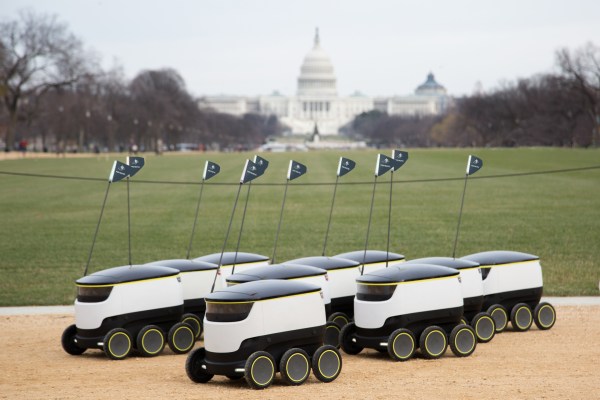Not even flexible, freelance jobs in the on-demand economy will be saved from the siege of automation. Starship Technologies is putting its self-driving delivery robots to work in the US. Specifically, its first US partners are the food delivery startup DoorDash, and courier marketplace Postmates, which are beginning pilot tests with Starship’s delivery robots in Redwood City, Calif. and Washington D.C. respectively.
Starship’s robots look something like a cooler on wheels. They travel at a top speed of about 4 miles per hour on busy town sidewalks or streets where the company has attained regulatory permission to roll among the people, and make deliveries. They can carry just over 40 lbs. at a time, and are generally programmed to deliver within a two-mile radius in real world scenarios.
Starship’s nearly self-driving robots are also powered by rechargeable lithium-ion batteries, so they’re relatively quiet and clean compared to something like diesel trucks idling on your corner, or the hoopty a driver may use for their pizza delivery job. A human operator oversees the use of the robots remotely through a fleet management app, but they primarily rely on computer vision and street map data to navigate and drop off an item at a customer’s door.
The robots don’t fly overhead, like delivery drones, risking the possibility of a collision, or payload damaged by a drop from the sky, of course. The promise of lower risk in terms of safety helped Starship raise $17.2 million (€16.5 million) in seed funding recently. The round was led by Mercedes-Benz Vans, and joined by Shasta Ventures, Matrix Partners, ZX Ventures, Morpheus Ventures, Grishin Robotics, Playfair Capital and others.
As of October 2016, Starship’s delivery robots had come into contact with at least 1.7 million people in 16 countries and 56 cities, and traveled 10,000 miles while making deliveries or conducting formal road tests, the company reports. Starship’s clients outside of the US have included Just Eat, Hermes Parcel Delivery, Media Markt, Swiss Post and Wolt. But the deals with Postmates and DoorDash represent a first for the London and Estonia-based startup.
According to DoorDash co-founder Stanley Tang, testing out robotic “dashers,” doesn’t mean the company will attempt to replace human workers any time soon, or ever. He said, “We have people who use cars, bikes, scooters, motorcycles or walk to make a delivery. And each has a different strength and suitability for different deliveries. Robots will be another type of vehicle in our system.”
Tang said the startup is still testing precisely how to integrate robots into its operations, but he envisions that a customer will opt to have their order delivered by robot, get a text message when the unit rolls up to their door, then will have to click a link in that message to open the locked bay on the so-called “personal delivery device” to retrieve their order.
Because workers on DoorDash get a tip based on the overall cost of the order they deliver, they tend not to want to do lots of small deliveries nearby, like the single, $7 burrito. Tang hopes to use robots to alleviate “dashers” of the deliveries they don’t want to do anyway.
Postmates is a larger operation than DoorDash at this point, delivering not just food and alcohol from restaurants, but also groceries and items from retailers to its customers. The company’s aims are similar to those of DoorDash’s though, in testing out Starship Technologies delivery robots– learn how it all works in the real world.
Postmates Senior Vice President Holger Luedorf said, “We don’t have a grand vision that robots would be the ultimate delivery mechanism or something. It’s far too early to say. We do want to gather a lot of data.” Postmates, and Starship, will be measuring data from the qualitative to the quantitative, including around how merchants and customers feel about interacting with robots, and what kind of delivery times robots can achieve compared to current numbers.
